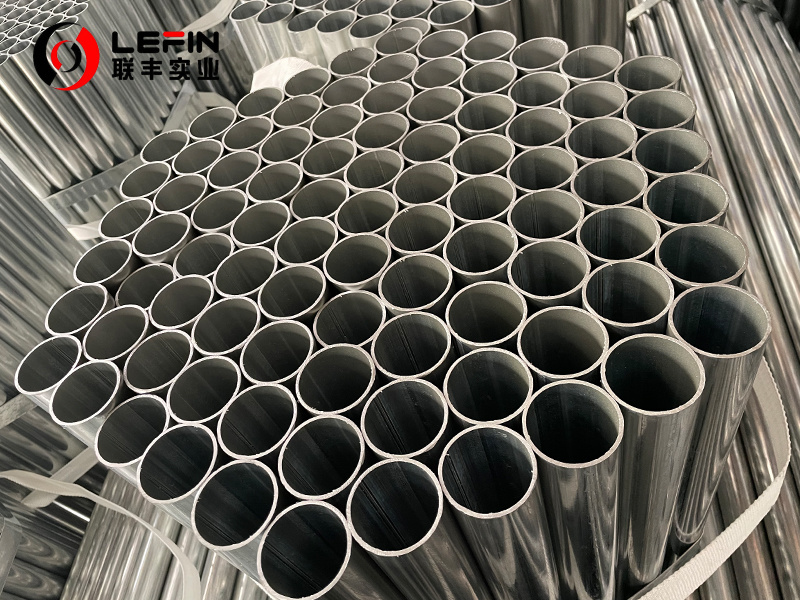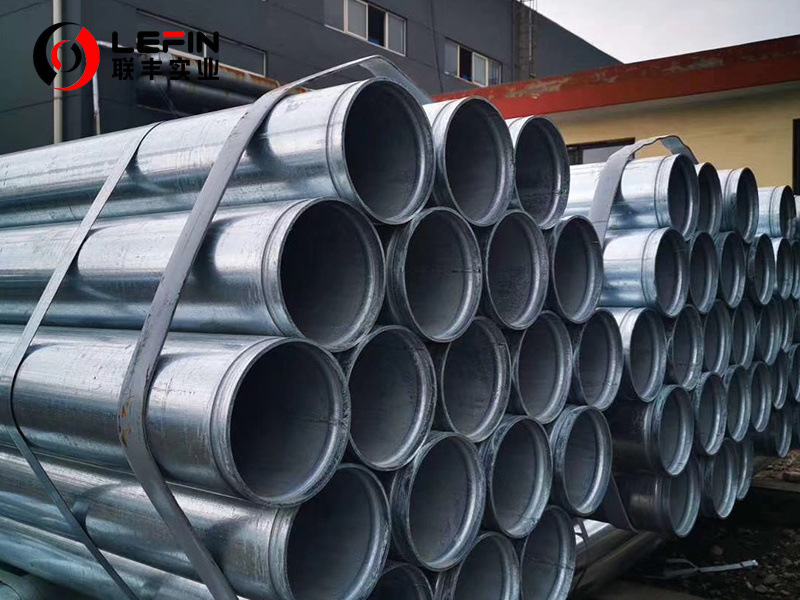



- Details
-
BS 1387 is a British Standard specification that defines the requirements for screwed and socketed, welded, and seamless steel tubes used for water, gas, and structural purposes. Galvanized Iron (GI) Pipes manufactured under this standard are widely used in plumbing, water supply, fencing, scaffolding, and other industrial applications due to their corrosion resistance and durability.
Key Features Of BS 1387 GI Pipes
Material & Manufacturing:
Made from mild steel (MS) with a hot-dip galvanized (GI) coating for corrosion resistance.
Available in welded (ERW/Electric Resistance Welded) or seamless forms.
Galvanization Process:
The pipes are dipped in molten zinc (hot-dip galvanization), ensuring a thick, protective layer that prevents rust and extends lifespan.
Grades & Classes:
Light (Light Gauge): Suitable for low-pressure applications (e.g., water supply).
Medium: Used for general plumbing and gas distribution.
Heavy (Heavy Gauge): Designed for high-pressure systems and structural uses.

Sizes & Dimensions:
Common sizes range from ½ inch (15mm) to 6 inches (150mm) in diameter.
Wall thickness varies based on class (Light, Medium, Heavy).
Threading & Joints:
Often supplied with threaded ends (screwed & socketed) for easy installation.
Can also be joined using couplings or welding (if required).
Standards & Compliance:
Complies with BS 1387:1985 (British Standard).Equivalent to ISO 65, DIN 2440, and ASTM A53 (with galvanization).

Applications And Advantages Of BS 1387 GI Pipes
Applications:
Plumbing & Water Supply (potable water lines).
Gas Distribution (low-pressure gas pipelines).
Scaffolding & Fencing (due to strength and rust resistance).
Construction & Structural Uses (e.g., handrails, support columns).
Advantages:
✔ Longevity: Zinc coating prevents rust, ensuring a lifespan of 20+ years.
✔ Cost-Effective: Cheaper than stainless steel but offers good durability.
✔ Easy Installation: Threaded ends simplify assembly without welding.
✔ High Strength: Suitable for both low and medium-pressure applications.
Conclusion
BS 1387 GI Pipes are a reliable choice for water, gas, and structural applications due to their corrosion resistance, strength, and compliance with international standards. They are particularly favored in the UK, Middle East, and Asian markets for infrastructure projects.

BS 1387 GI Pipes
Subcategory
Keyword
- Details
-
BS 1387 is a British Standard specification that defines the requirements for screwed and socketed, welded, and seamless steel tubes used for water, gas, and structural purposes. Galvanized Iron (GI) Pipes manufactured under this standard are widely used in plumbing, water supply, fencing, scaffolding, and other industrial applications due to their corrosion resistance and durability.
Key Features Of BS 1387 GI Pipes
Material & Manufacturing:
Made from mild steel (MS) with a hot-dip galvanized (GI) coating for corrosion resistance.
Available in welded (ERW/Electric Resistance Welded) or seamless forms.
Galvanization Process:
The pipes are dipped in molten zinc (hot-dip galvanization), ensuring a thick, protective layer that prevents rust and extends lifespan.
Grades & Classes:
Light (Light Gauge): Suitable for low-pressure applications (e.g., water supply).
Medium: Used for general plumbing and gas distribution.
Heavy (Heavy Gauge): Designed for high-pressure systems and structural uses.

Sizes & Dimensions:
Common sizes range from ½ inch (15mm) to 6 inches (150mm) in diameter.
Wall thickness varies based on class (Light, Medium, Heavy).
Threading & Joints:
Often supplied with threaded ends (screwed & socketed) for easy installation.
Can also be joined using couplings or welding (if required).
Standards & Compliance:
Complies with BS 1387:1985 (British Standard).Equivalent to ISO 65, DIN 2440, and ASTM A53 (with galvanization).

Applications And Advantages Of BS 1387 GI Pipes
Applications:
Plumbing & Water Supply (potable water lines).
Gas Distribution (low-pressure gas pipelines).
Scaffolding & Fencing (due to strength and rust resistance).
Construction & Structural Uses (e.g., handrails, support columns).
Advantages:
✔ Longevity: Zinc coating prevents rust, ensuring a lifespan of 20+ years.
✔ Cost-Effective: Cheaper than stainless steel but offers good durability.
✔ Easy Installation: Threaded ends simplify assembly without welding.
✔ High Strength: Suitable for both low and medium-pressure applications.
Conclusion
BS 1387 GI Pipes are a reliable choice for water, gas, and structural applications due to their corrosion resistance, strength, and compliance with international standards. They are particularly favored in the UK, Middle East, and Asian markets for infrastructure projects.

Related products
Product Consulting

Address: Hengtai Road,Daqiuzhuang Town,Jinghai County,Tianjin,China
Mob: +8615122229899(whatspp)
Phone: +86 22 58171905
Fax: +86 22 58171902
E-mail:info@lefinsteel.com
Get company updates

Tianjin Lefin Industrial Co.,Ltd. All rights reserved City sub-station SEO www.300.cn

